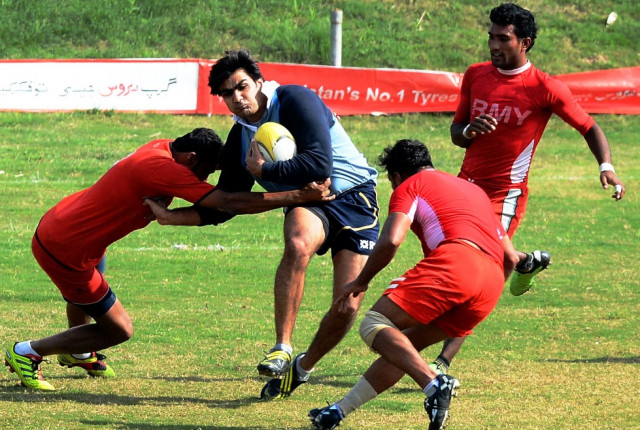Pakistan looks to kabaddi to help build rugby
Pakistan Rugby Union has grown rapidly since it was founded 10 years ago and now boasts more than 3,000 players.

Rugby players fight for the ball during a match between the Army and team Lahore. PHOTO: AFP
Kabaddi, in which players hold their breath and try to tag an opponent before making it back to their half of the field, involves many of the skills needed for rugby - speed, strength, tackling and evasive running.
In a country where anything other than cricket struggles to get a look in, the PRU has grown rapidly since it was founded 10 years ago and now boasts more than 3,000 regular players.
And after the launch of a new "Super League" last month, PRU president Fawzi Khawaja said he now hopes to tap the reservoir of kabaddi talent.
The traditional team sport is very popular, particularly in Punjab, and last year Pakistan were winners of the Asia Cup and runners-up in the World Cup against arch-rivals India.
But Khawaja said that while there were national-level kabaddi players in the police rugby team, it was hard to lure people from what is a lucratively paid professional sport.
"If and when we can graduate to paying our players I'm sure we can attract a lot of kabaddi players," he told AFP.
The new league started on a sunny spring Sunday in Lahore, Pakistan's second largest city. The posts were lengths of bamboo taped to football goals and the groundsmen were still painting lines on the pitch 10 minutes before kick-off.
But the competition in the four-team top division was fierce, with the opening round pitting the Army against Lahore, and Islamabad against the Defence Housing Association, a government department team.
While the Lahore-Army clash showed some early-season rustiness, fumbles and tactical naivety, the game was also packed with blood-curdling tackles, two sin-binnings and a suspected dislocated shoulder.
The Army's superior fitness helped them come from behind to win 12-8.
The national side were relegated to the fourth tier of the Asian Five Nations tournament last year but the PRU hopes that by replacing ad-hoc club matches with a proper competitive structure, the Super League will spark a resurgence.
"We found that we had not much of a benchmark when we were trying to judge how people would perform," PRU secretary Arif Saeed said.
"They had good athletic ability, good basic rugby skills, but it's only how they perform in matches that tells you how they will do under pressure."
Rugby in Pakistan dates back to the 1920s but was the preserve of expatriates for decades and still gets virtually no TV airtime on cable sports channels.
But Lahore and Pakistan number eight Arsalan Zahid said once they are introduced to the game, many Pakistanis find the physical aspect hugely appealing.
"When they see the monotony in all the (other) games, they try to find the sport that is different in its own way and rugby, considering it's very aggressive, is a good sport to take up," he said.
Fiaz Ahmed, number eight for the Army, who have several former kabaddi men in their side, said many players found the transition quite easy.
"The tackling and grappling is almost identical, there's a lot of focus on upper body strength in kabaddi also and rugby is very similar to kabaddi in the physical aspects," he said.
There are 25 registered clubs in Pakistan and Khawaja said the PRU wants to take the solid base of the existing crop of players to the next level.
"What we want to see is improvement in performance, not just increase in numbers - 3,000 is sufficient if we can bring on the quality," he said.
But funding is tight and it is not cheap attracting foreign coaches to Pakistan, where attacks blamed on the Taliban and other Al-Qaeda affiliates are a near-daily menace, and security is a constant worry.
Two foreign coaches worked with the national team in 2011 and 2012 but only stayed for a few months. The aim now is to persuade someone to stay longer.
Mohammed Javed Iqbal, a taxi driver who stopped to watch the Super League matches, was impressed with his first taste of rugby.
"It's a great game to watch. Before when there was wrestling on TV everybody used to enjoy watching that, so they'd enjoy watching this," he told AFP.



















COMMENTS
Comments are moderated and generally will be posted if they are on-topic and not abusive.
For more information, please see our Comments FAQ